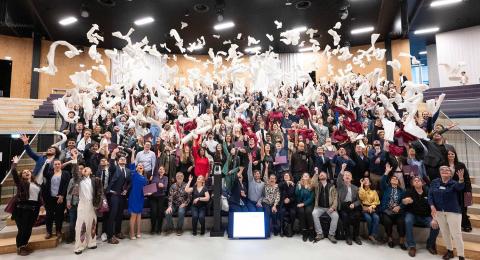The M2 RDSA program trains students in the most advanced analytical methods to decipher complex systems. Supported by Paris-Saclay’s cutting-edge laboratories and platforms, it stands out through a unique focus on chemometrics, hyperspectral imaging, and the analysis of living systems, preparing graduates for both academic research (PhD) and careers in industrial R&D
L'objectif de cette spécialité de Master est de donner aux étudiants une formation scientifique fondée sur l'apprentissage de méthodologies de la recherche expérimentale et de leur fournir en particulier les outils nécessaires à la mise en œuvre de la démarche des sciences analytiques, lorsque sont abordées l'étude de phénomènes et de milieux complexes (milieux vivants, matrices agro-alimentaires et biologiques, milieux naturels). Elle a pour finalités :
Donner aux étudiants des compétences scientifiques et stratégiques pour devenir de bons manageurs de projets de recherche
Former de potentiels candidats qualifiés pour l'obtention de bourses de thèse
Donner une accessibilité à des services de R&D industriels
Information
Skills
Master the principles of measurement, including performance, limitations, and approaches for the validation of analytical methods.
Design and carry out a scientific project, establishing specifications, a work plan, and a funding plan.
Master analytical instrumentation applied to the study of phenomena in complex matrices.
Optimize experimental design and data processing using chemometric methods.
Select and apply an appropriate data processing strategy.
Master computational tools for analytical imaging and associated data management.
Use computational tools for the prediction and processing of spectral data.
Take advantage of and integrate into the rich scientific environment of Paris-Saclay, particularly in terms of platforms and large-scale instruments.
Master written and oral presentation of scientific results.
Objectives
The objective of this Master’s program is to provide students with a solid scientific education based on the learning of experimental research methodologies, and in particular to equip them with the necessary tools to implement analytical science approaches when studying phenomena and complex systems (living organisms, agro-food and biological matrices, natural environments).
Its aims are to:
- Develop students’ scientific and strategic skills to become effective research project managers.
- Train highly qualified candidates for doctoral fellowships.
- Provide access to opportunities in industrial R&D.
This program provides students with the scientific foundation required to pursue a PhD or to join innovation, research, and development teams as executives in public or private companies in the fields of pharmacy, cosmetology, agri-food, and biology.
Career Opportunities
Career prospects
Après un master : Chargé(e) d’études
Après Master + Doctorat : chercheur ou enseignant-chercheur
Après un Master ou Master + Doctorat : ingénieur (R&D, contrôle, production…)
Après un Master ou Master + Doctorat : ingénieur (recherche-développement, contrôle, production…) dans les domaines santé, pharmacie, agroalimentaire, biotechnologies, instruments et réactifs, cosmétique, dépollution et environnement
Après un Master ou Master + Doctorat : ingénieur (recherche et développement, contrôle, production…)
Chef de projet
enseignant.e-chercheur.se (après un doctorat)
Ingénieur développement
Ingénieur.e d’études
Ingénieur.e recherche & développement
Responsable de projets R&D
Further Study Opportunities
Chercheur/chercheuse en R&D ou expert·e en modélisation et analyse de données dans des entreprises ou laboratoires de pointe.
Data Scientist, Data Analyst, Ingénieur·e en Machine Learning dans des secteurs innovants (tech, finance, santé, énergie, etc.) ;
Doctorat
Doctorat en Chimie / Biologie
Master Sciences du médicament et des produits de santé
Fees and scholarships
The amounts may vary depending on the programme and your personal circumstances.
Capacity
Available Places
Target Audience and Entry Requirements
To be admitted to the RDSA M2, students must have completed a level of studies at least equivalent to:
- M1 route specialising in Analytical Chemistry, or
- Under certain conditions, 5th year of Pharmacy studies in France or a European Union country, or
- Chemical engineers graduated in France or a European Union country, or
- Under certain conditions, students admitted to the 3rd year of an engineering school
- AgroParisTech students admitted to the 2nd year can directly access the M2
- Students from countries outside the European Union must put together a file which will be examined by a VAA equivalence commission. Access to M2 is also open in continuous education; validation of M1 skills is then obtained by VAE (validation of prior experience).
Application Period(s)
From 13/04/2026 to 08/06/2026
Supporting documents
Compulsory supporting documents
Copy of identity document.
Motivation letter.
All transcripts of the years / semesters validated since the high school diploma at the date of application.
Curriculum Vitae.
Detailed description and hourly volume of courses taken since the beginning of the university program.
Additional supporting documents
Certificate of English level (compulsory for non-English speakers).
Certificate of French (compulsory for non-French speakers).
VAP file (obligatory for all persons requesting a valuation of the assets to enter the diploma).
Supporting documents :
- Residence permit stating the country of residence of the first country
- Or receipt of request stating the country of first asylum
- Or document from the UNHCR granting refugee status
- Or receipt of refugee status request delivered in France
- Or residence permit stating the refugee status delivered in France
- Or document stating subsidiary protection in France or abroad
- Or document stating temporary protection in France or abroad.
| Subjects | ECTS | Semestre | Lecture | directed study | practical class | Lecture/directed study | Lecture/practical class | directed study/practical class | distance-learning course | Project | Supervised studies |
|---|---|---|---|---|---|---|---|---|---|---|---|
| UE obligatoire | |||||||||||
| Management de projets | Semestre 2 | 16 | 16 | ||||||||
| UE optionnelle | |||||||||||
| UE libre S1 | Semestre 1 | ||||||||||
| UE libre S2 | Semestre 2 | ||||||||||
| Subjects | ECTS | Semestre | Lecture | directed study | practical class | Lecture/directed study | Lecture/practical class | directed study/practical class | distance-learning course | Project | Supervised studies |
|---|---|---|---|---|---|---|---|---|---|---|---|
| Stage de recherche | Semestre 2 | ||||||||||
| Subjects | ECTS | Semestre | Lecture | directed study | practical class | Lecture/directed study | Lecture/practical class | directed study/practical class | distance-learning course | Project | Supervised studies |
|---|---|---|---|---|---|---|---|---|---|---|---|
| Plateforme analytique (RMN, spectroscopies, spectrométrie de masse) | Semestre 1 | 36 | 6 | 9 | |||||||
| Stratégies analytiques | Semestre 1 | 48 | |||||||||
| Mélanges et matrices complexes : problématique, méthodes et instruments | Semestre 1 | 48 | |||||||||
| Outils chimiométriques pour la mise en place d'un projet expérimental et pour le traitement des données | Semestre 1 | 33 | 15 | ||||||||
| Imagerie et analyse directe du vivant | Semestre 1 | 48 | |||||||||









